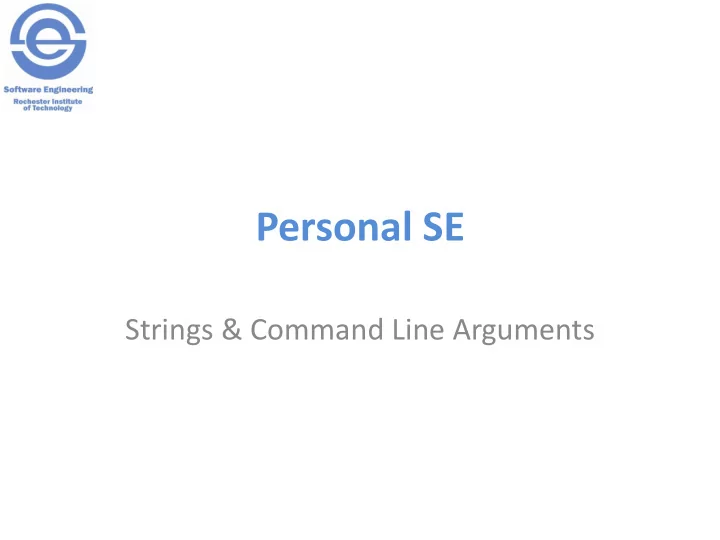

Personal SE Strings & Command Line Arguments
Strings in C • A string is just an array of chars: char wel char welcome[] = come[] = "Hello" "Hello" ; ; // C / C permi rmits ts this this • This is an array of 8-bit bytes holding ASCII characters.
Strings in C • A string is just an array of chars: char wel char welcome[] = come[] = "Hello" "Hello" ; ; // C / C per permit mits th s this is • This is an array of 8-bit bytes holding ASCII characters • The array in memory looks like this: 'H' 'e' 'l' 'l' 'o' '\0' • Whoa! What’s that last character???? • In C, proper strings must be terminated with a NUL (0) character. • We always need an extra byte to hold the terminator!
Strings in C • Assume we are reading and processing lines of text, where at most the first 80 characters of a line are useful • How would we declare an array to hold the line as a string?
Strings in C • Assume we are reading and processing lines of text, where at most the first 80 characters of a line are useful • How would we declare an array to hold the line as a string? #define MAXLINE (80) char line[ MAXLINE + 1 ] ; // 1 extra character for the NUL
Strings in C • Assume we are reading and processing lines of text, where at most the first 80 characters of a line are useful • How would we declare an array to hold the line as a string? #define MAXLINE (80) char line[ MAXLINE + 1 ] ; // 1 extra character for the NUL • How would we read in such a line?
Strings in C • Assume we are reading and processing lines of text, where at most the first 80 characters of a line are useful • How would we declare an array to hold the line as a string? #define MAXLINE (80) char line[ MAXLINE + 1 ] ; // 1 extra character for the NUL • How would we read in such a line? void readline( char line[], int maxsize ) { int i = 0 ; int ch ; for ( ch = getchar() ; ch != '\n' && ch != EOF ; ch = getchar() ) { if ( i < maxsize ) { line[ i++ ] = ch ; } } line[ i ] = '\0' ; return ; }
Strings in C • How can we copy one string to another? • Modify acopy to strcpy: void strcpy( char sto[], char sfrom[] ) { int i ; for ( i = 0 ; sto[ i ] = sfrom[ i ] ; ++i ) ; }
Strings in C • How can we copy one string to another? • Modify acopy to strcpy: void strcpy( char sto[], char sfrom[] ) { int i ; for ( i = 0 ; sto[ i ] = sfrom[ i ] ; ++i ) ; } Copy the ith character. If this was a NUL, exit the loop.
String Library #include <string.h> int strlen( char str[] ) ; Note: strlen("Hello") == 5 void strcpy( char sto[], char sfrom[] ) ; void strncpy( char sto[], char sfrom[], unsigned n ); Note: Copies ' n ' characters to 's to ' from 's from ', padding with '\0' as necessary. Note: If 's from ' is too long to fit in 's to ', then ' sto ' will NOT be NUL terminated. int strcmp( char str1[], char str2[] ) ; Note: comparison is in dictionary order. Note: returns -1, 0, 1 if ' str1 ' is less than, equal to, or greater than ' str2 ', respectively.
Command Line Arguments The full declaration of main is: int main( int argc, char **argv ) ;
Command Line Arguments The full declaration of main is: int main( int argc, char **argv ) ; argc = argument count (the number of command line arguments). argc >= 1, as the program name is the 0th argument.
Command Line Arguments The full declaration of main is: int main( int argc, char **argv ) ; argc = argument count (the number of command line arguments). Includes the program name as the 0th argument. Example: ac == 5 gcc -o myprog main.c util.c 0 1 2 3 4
Command Line Arguments The full declaration of main is: int main( int argc, char **argv ) ; argv = the argument vector - allows access to the arguments it's a pointer, but don't worry - treat it like a 2D array. argv[ i ] is i th argument as a string (array). argv[ i ][ j ] is the j th character of the i th argument.
Example – Echo Arguments #include <stdlib.h> #include <stdio.h> #include <string.h> int main( int ac, char **argv ) { int i ; printf( "Program name = %s\n", argv[0] ) ; for( i = 1 ; i < ac ; ++i ) { printf( "argv[%d] = %s ", i, argv[i] ) ; printf( "and its length is %d\n", strlen( argv[i] ) ) ; } return 0 ; }
Recommend
More recommend